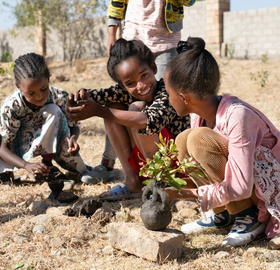Dear friends and supporters of Finks-Hawzien,
I hope you are well in these times and that you are and remain healthy. I am currently in contact with Hawzien as much as possible and would like to give you an insight into life on site, the current situation and the near future. So much in advance: The prospects are not great and your help is urgently needed.
The shutdown of public life is happening everywhere. The effects of this shutdown of public life are hitting the countries of the global South much harder. It is already becoming apparent that the people in these countries, and this includes Ethiopia at the top of the list, are not only threatened by a virus crisis, but that the socio-economic effects of the shutdown will also cause many deaths. Perhaps even more than the virus itself. In addition, the East African locust plague continues to spread and threatens the livelihoods of millions of people.
I am well aware that here in Germany, too, the loss of work, short-time work and the closure of the German food banks are causing fear and uncertainty. Fear and insecurity are always experienced individually. They are not comparable.
But misery is comparable when it becomes substantial, when the chance to get food decides over life and death. The people in Hawzien are preparing themselves for exactly this situation. How can one prepare for it? By panic buying and stockpiling? Without money, without cooling facilities, and faced with an impending monsoon season, implying wet and moldy flousr? Quite apart from the fact that panic buying is anyway problematic. Facilities with the possibility of generous stockpiling are potential victims of robberies in the worst of times, which is feared to come yet hopefully will not come. There is a real concern that the large weekly markets with over 2,000 visitors will be prohibited, which would deprive many families in and around Hawzien of any livelihood. Many families depend on the sale of their agricultural or handicraft goods and would be destitute if the markets were to be canceled. Dr. Atsbaha Gebre-Selasie estimates that at least 150 families in Hawzien are affected by life-threatening malnutrition or even starvation. Some families are already rationing the food in order to be provided for a few days longer in case of emergency. The consequence is that not every child is provided with enough food every day. What will happen when the complete shutdown is declared in Hawzien? At present there are 82 people infected with Covid19 in Ethiopia, three have died so far and 14 are completely healed (as of April 14, 2020). In all of Tigray and Hawzien there is no known infected person so far. Nevertheless, the kindergartens and schools have been closed since 25 March 2020. This was initially planned for 14 days and has now been extended to the next three months. The kindergarten children and school children stay at home. State education is provided with the help of radio and TV. But not all families have radio and TV at home. For the poor the situation is very difficult. Our teachers provide counseling on how to prevent a Covid19 infection and help with soap, other hygiene items, and general advice.
The idea we are currently pursuing may not be perfect, but appears to be the only sensible one: to provide financial support to needy families when necessary. One family needs about 900 Birr (25 €) per week to survive, that is 100 € per month. The 150 POOREST families in Hawzien would thus need 15.000 € in emergency aid.
I must honestly say that I have never found myself in such a situation before. I have been collecting money for Hawzien since I was 17 years old, I have always perceived the project to be very useful (and still do), and I leave the so-called emergency aid in crisis areas to other organizations. These other organizations (as well as our umbrella organizations: The Friends of Waldorf Education and the Zukunftsstiftung Entwicklung – the Zukunftsstiftung Entwicklung is a foundation to promote ecologically and socially sustainable development in selected projects in Asia, Africa and Latin America) are currently overburdened and are not able to provide emergency aid for their projects without increased support (even if they do their best). I am afraid and feel overwhelmed, suddenly it is a matter of life and death. If we do nothing, the life of many people is threatened. Therefore I ask you from the bottom of my heart to help the families in Hawzien (or anywhere else in the world) to cope with this situation.
I will keep you informed about the situation in Hawzien and the use of the funds.
Stay well and in good spirits!
Magdalena Bächtle

